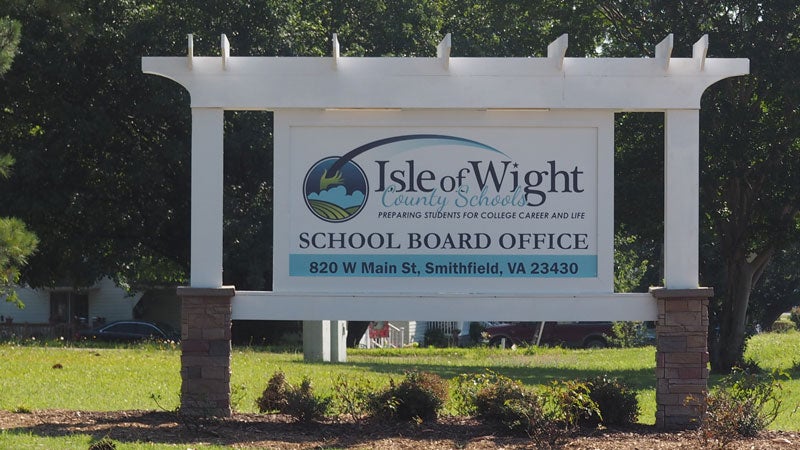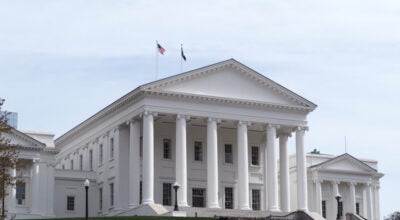Bill proposing state standards for solar farms advances
Published 3:29 pm Friday, January 24, 2025

- A solar farm along Courthouse Highway is one of 11 approved in Isle of Wight County. (Photo by Stephen Faleski | The Smithfield Times)
A Virginia Senate bill that would standardize what criteria localities are to use when evaluating applications for new solar farms or energy storage facilities has cleared its first hurdle.
Senate Bill 1114 passed the Senate Committee on Local Government 13-1 on Jan. 20.
State Sens. Jeremy McPike, D-Woodbridge, Travis Hackworth, R-Richlands, Lamont Bagby, D-Richmond, Glen Sturtevant, R-Midlothian, Lashrecse Aird, D-Petersburg, Danica Roem, D-Manassas, Angelia Williams Graves, D-Norfolk, Tara Durant, R-Fredericksburg, J.D. “Danny” Diggs, R-Yorktown, Stella Pekarsky, D-Centreville, Kannan Srinivasan, D-Broadlands, Luther Cifers, R-Farmville, and the bill’s sponsor, Schuyler VanValkenburg, D-Richmond, each voted to advance the bill to the Senate Committee on Commerce and Labor. State Sen. Bill Stanley, R-Moneta, cast the lone dissenting vote.
A companion bill sponsored by Del. Candi Mundon King, D-Dumfries, was referred from the House Committee on Counties, Cities and Towns on Jan. 21. On Jan. 23, a Cities, Counties and Towns subcommittee consisting of Dels. Briana Sewell, D-Woodbridge, Shelly Simmonds, D-Newport News, Atoosa Reaser, D-Loudoun, Katrina Callsen, D-Charlottesville, Laura Jane Cohen, D-Fairfax, James “Will” Morefield, R-Tazewell, and Anne Ferrell Tata, R-Virginia Beach voted to advance the bill, while Del. Keith Hodges, R-Urbanna, voted against it and Mundon King was absent.
The two bills stipulate that ground-mounted solar farms “shall be permitted” on agricultural-zoned land and would strike “unless a local ordinance provides otherwise” from existing state law.
The bills would further require localities to adopt zoning ordinance amendments allowing a special exception for solar farms or energy storage facilities that comply with 12 criteria, including a 150- to 300-foot buffer from the nearest edge of the equipment to the nearest occupied building and a minimum 125 feet from the center of any state-maintained road. Additional criteria include a prohibition on removing topsoil, wildlife corridors where needed, a written decommissioning agreement, compliance with Virginia Department of Environmental Quality stormwater regulations and a requirement that visual impacts to agricultural preservation areas, public parks and historic structures “be minimized.”
A third bill by Del. Richard “Rip” Sullivan, D-Fairfax, dubbed HB 2126, would establish a “Virginia Energy Facility Review Board” and would mandate that by July 1, 2026, each locality adopt an ordinance “consistent with” a model ordinance adopted by the proposed review board. It would require that no local ordinance include any “unreasonable restriction” on the installation of a “critical interconnection project” or any prohibition on solar panels that comply with “generally accepted national environmental protection and product safety standards.
Sullivan’s bill has been referred to the House Committee on Labor and Commerce.
The proposed review board would issue its opinion on a proposed solar farm within 90 days of receiving a developer’s application. The bill would require the host locality to issue its final decision regarding any zoning change or conditional use permit within six months of the review board issuing its opinion, and explain in writing if its decision diverges from the review board’s recommendation. Developers would have the option to appeal a local denial to that locality’s Circuit Court.
The Local Government Committee vote comes two weeks after a 7-5 vote by the Virginia Commission on Electric Utility Regulation, or CEUR, on Jan. 6 to recommend legislation be drafted that would require localities to adopt model ordinances setting parameters for how they are to evaluate solar farm applications. CEUR had also recommended the establishment of the proposed review board.
CEUR contends new legislation is needed to meet the 2020 Virginia Clean Economy Act’s mandate that Dominion Energy transition to 100% carbon-free energy sources by 2045. The body, which consists of 10 legislators and three non-legislator members, came into existence in 2003 from legislation allowing the transition to retail competition among electric utilities like Dominion and had been dormant for nearly six years until being reactivated in 2023 to address rising statewide electricity demand.
Currently, town and city councils and county boards of supervisors have broad discretion in the amount of time they take and the criteria they use to evaluate solar farm applications. A multistate coalition of solar, wind and battery storage developers known as the Mid-Atlantic Renewable Energy Coalition, or MAREC, which has been advising CEUR, says the patchwork of local regulations has resulted in 33 solar farm proposals over the past 18 months being denied or withdrawn across Virginia.
“Over half of Virginia’s counties have signaled to solar energy that they are closed for business,” said Evan Vaughan, executive director of MAREC, in a news release applauding SB 1114’s advancing. “There are 55 counties and cities that have either banned or made it difficult and costly to develop utility-scale solar projects. Others have no ordinances at all to regulate solar projects. We acknowledge localities that have welcomed solar projects, but the current situation makes the development process inconsistent and unpredictable for localities and developers alike at the very time that Virginia needs more clean energy.”
Isle of Wight County has approved 11 solar farms to date, including the 2,200-acre, 240-megawatt Sycamore Cross solar farm in 2024 that would be the county’s largest and span the Isle of Wight-Surry county line at its westernmost edge. Also last year, Isle of Wight supervisors voted to reject the 44-megawatt Moonlight solar farm that would have spanned 231 fenced acres at Burwells Bay and Moonlight roads, and rejected a 3-megawatt solar farm proposed for 23 acres off Old Stage Highway.
While MAREC contends its goal isn’t to take away local authority, Isle of Wight County supervisors say that’s exactly what the proposed legislation would do.
“Any time you’re trying to strip localities of their ability to govern and represent the citizens I think is the wrong direction to go in,” said Isle of Wight Board of Supervisors Chairman Don Rosie during a discussion of HB 2126 at the supervisors’ Jan. 16 meeting.
“At the end of the day when there’s an issue because our citizens don’t want it in their back yard or other issues that come up that it seems to me that it’s crafted in such a way that it’s going to make it look like the localities are to blame for why we have an energy crisis,” said Supervisor Joel Acree. “I mean, they’re building data centers, the energy demand is just continually growing.”
“We have always in times past stood against any bills that would come to the state legislature that undermines or takes away local authority and the ability of citizens to be a part of the process,” said Supervisor William McCarty. “Not only do I believe we as a county have such a stance but in the Virginia Association of Counties, of which I am currently the president-elect and Mr. Acree is the Region 1 director, VACO has a strong position against any and all bills that would come down the pipeline that would take away local authority for land use for any reason, to include solar or any other such thing.”





